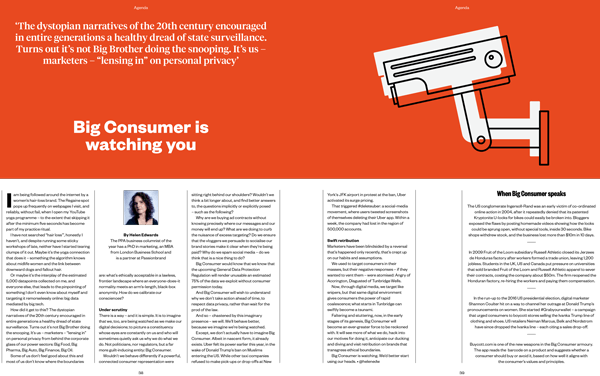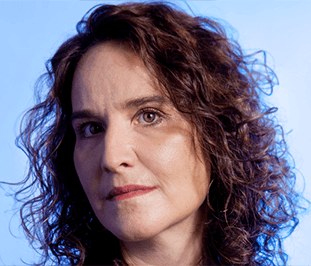Big consumer is watching you
I am being followed around the internet by a women’s hair-loss brand. The Regaine spot pops up frequently on webpages I visit, and reliably, without fail, when I open my YouTube yoga programme – to the extent that skipping it after the minimum five seconds has become part of my practice ritual.
I have not searched “hair loss’”, honest I haven’t, and despite running some sticky workshops of late, neither have I started tearing clumps of it out. Maybe it’s the yoga connection that does it – something the algorithm knows about midlife women and the link between downward dogs and fallout hair.
Or maybe it’s the interplay of the estimated 5,000 datapoints collected on me, and everyone else, that leads to the pinpointing of something I don’t even know about myself and targeting it remorselessly online: Big Data mediated by Big Tech.
How did it get to this? The dystopian narratives of the 20th century encouraged in entire generations a healthy dread of state surveillance. Turns out it’s not Big Brother doing the snooping. It’s us – marketers – lensing in on personal privacy from behind the corporate glass of our power sectors: Big Food, Big Pharma, Big Auto, Big Finance, Big Oil.
Some of us don’t feel good about this and most of us don’t know where the boundaries are: what’s ethically acceptable in a lawless, frontier landscape where an everyone-does-it normality meets an arm’s-length, black-box anonymity. How do we calibrate our consciences?
There is a way – and it is simple. It is to imagine that we, too, are being watched as we make our digital decisions; to picture a constituency whose eyes are constantly on us and who will sometimes quietly ask us why we do what we do. Not politicians, nor regulators, but a far more guilt-inducing entity: Big Consumer.
Wouldn’t we behave differently if a powerful, connected consumer representation were sitting right behind our shoulders? Wouldn’t we think a bit longer about, and find better answers to, the questions implicitly or explicitly posed? Like these:
Why are we buying ad contracts without knowing precisely where our messages and our money will end up? What are we doing to curb the nuisance of excess targeting? Do we ensure that the vloggers we persuade to socialise our brand stories make it clear when they’re being paid? Why do we spam social media – do we think that is a nice thing to do?
 Big Consumer would know that we know that the upcoming General Data Protection Regulation will render unusable an estimated 75% of the data we exploit without consumer permission today. And Big Consumer will wish to understand why we don’t take action ahead of time, to respect data privacy, rather than wait for the prod of the law. And so – chastened by this imaginary presence – we will. We’ll behave better, because we imagine we’re being watched.
Big Consumer would know that we know that the upcoming General Data Protection Regulation will render unusable an estimated 75% of the data we exploit without consumer permission today. And Big Consumer will wish to understand why we don’t take action ahead of time, to respect data privacy, rather than wait for the prod of the law. And so – chastened by this imaginary presence – we will. We’ll behave better, because we imagine we’re being watched.
Except, we don’t actually have to imagine Big Consumer. Albeit in nascent form, it already exists. Uber felt its power earlier this year, in the wake of Donald Trump’s ban on Muslims entering the US. While other taxi companies refused to make pick-ups or drop-offs at New York’s JFK airport in protest at the ban, Uber activated its surge pricing.
That triggered #deleteuber: a social-media movement, where users tweeted screenshots of themselves deleting their Uber app. Within a week, the company had lost 500,000 accounts.
Marketers have been blindsided by a reversal that’s happened only recently, that’s crept up on our habits and assumptions.
We used to target consumers in their masses, but their negative responses – if they wanted to vent them – were atomised: Angry of Accrington, Disgusted of Tunbridge Wells.
Now, through digital media, we target like snipers, but that same digital environment gives consumers the power of rapid coalescence; what starts in Tunbridge can swiftly become a tsunami.
Faltering and stuttering, now, in the early stages of its genesis, Big Consumer will become an ever-greater force to be reckoned with. It will see more of what we do, hack into our motives for doing it, anticipate our ducking and diving and visit retribution on brands that transgress ethical boundaries.
Big Consumer is watching. We’d better start using our heads.
The US conglomerate Ingersoll-Rand was an early victim of coordinated online action in 2004, after it repeatedly denied that its patented Kryptonite U-locks for bikes could easily be broken into. Bloggers exposed the flaws by posting homemade videos showing how the locks could be sprung open, without special tools, inside 30 seconds. Bike shops withdrew stock, and the business lost more than $10m in 10 days.
In 2009 Fruit of the Loom subsidiary Russell Athletic closed its Jerzees de Honduras factory after workers formed a trade union, leaving 1,200 jobless. Students in the UK, US and Canada put pressure on universities that sold branded Fruit of the Loom and Russell Athletic apparel to sever their contracts, costing the company about $50m. The firm reopened the Honduran factory, re-hiring the workers and paying them compensation.
In the run-up to the 2016 US presidential election, digital marketer Shannon Coulter hit on a way to channel her outrage at Donald Trump’s infamous pronouncements on women. She started #Grabyourwallet – a campaign that urged consumers to boycott stores selling the Ivanka Trump line of clothing and shoes. US retailers Neiman Marcus, Belk and Nordstrom have since dropped the Ivanka line – each citing a sales drop-off.
Buycott.com is one of the new weapons in the Big Consumer armoury. The app reads the barcode on a product and suggests whether a consumer should buy or avoid it, based on how well it aligns with the consumer’s values and principles.
